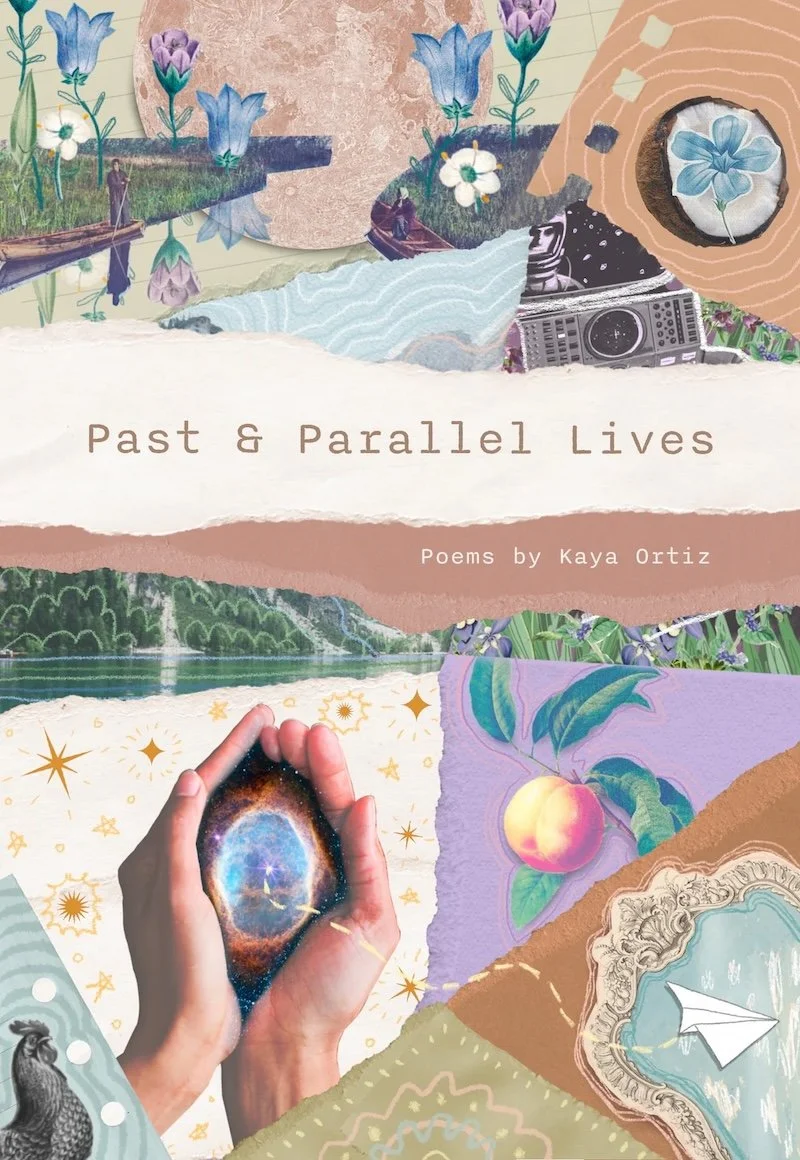Past & Parallel Lives by Kaya Ortiz
“Time is a woven cloth.”
If time is a woven cloth, then Kaya Ortiz’s Past & Parallel Lives (2025) sets out to unravel it – slowly, surely, and then all at once. If time were a glass pane, then this is a poetry collection that takes time and shatters it against the wall, decorating the floor with a mosaic of could-have-beens. It is like looking directly into a fractured mirror – both revelatory and dazzling in its disarray. In reading, we witness as Ortiz performs a post-mortem on the lives they have lived thus far, of the ways these past selves haunt and intertwine and die and live on. It feels like an honour to be let inside the pages of this journal-like confessional, to revel in the secret and the mystery; to hold Ortiz's innermost thoughts and feelings between our fingertips and try to piece together their story. (Or our version of it, at least.)
Ortiz is a queer, migrant poet of Filipino and English/Scottish descent, who works and writes on unceded Whadjuk Noongar country. Past & Parallel Lives is their debut collection, and was the winner of the 2024 Dorothy Hewett Award. Something that is immediately apparent within the first few pages is Ortiz’ deep love for space and the extraterrestrial; they use galactic symbolism to paint an intimate picture of their experiences of being othered. The collection opens with 'Final Boarding Call', a poem that describes their departure from their homelands in the Philippines, and arrival on 'Australian’ shores. A few pages later, in ‘First Contact’, they confess how they approach their own consequent disorientation: “no one tells you the rules, so you / observe the rituals.” This idea bleeds through the rest of the collection – that part and parcel of their status as alien is the compulsion to observe, to witness, to try to understand. From here, we wander through Ortiz’s cosmic inner world, as they try to make sense of these foreign lands, as well as their deeper self. We quickly become accustomed to Ortiz’s own rituals; from suitcases and flights, to Star Trek, queer longing, tumblr and prayer. The thematic of space comes up again and again, orbiting Ortiz throughout their life, in dreams (“Last full-moon violet night I made out with Rosa Diaz in a dream”), and regrets (“what is gone & left behind, rusting amongst the ruins of stars, the bone & dust of planetary rock”).
The collection is divided into three parts: requiem, reincarnation and revelation. Nonetheless, there is not necessarily a chronological timeline to the journey of self-understanding that Ortiz takes us on; instead, across parts, they drift between different scenes, often reiterating the fluidity of it all. Fittingly, there are poems that can be read multiple ways; just on the left, just on the right, or from left to right as usual, such as the beautiful ‘Habi (Woven)’. These are known as contrapuntals, a poetic form which Ortiz has previously spoken to Liminal Magazine about loving for their way of “weaving… through place, time and language.” There are also other ways in which form is used to demonstrate the fluidity of time and space, such as ‘Alternate Timelines’ – this poem is comprised of a list of events rearranged in a random order; there is no way to know if it is the true order, or if the numbers indicate the true order, or if a true order exists (or if it is possible, or if it matters). Instead, we are asked to lean deeper into the fracturing.
As I read through these pages I found myself deeply moved by Kaya’s voyage to their present, authentic self – one where they no longer wear their “skin like a mirror.” Coming to terms with the truth of who you are in this way requires so much revelation, so much reincarnation, so much requiem – and above all, so much death. It requires watching your world end and begin again so many times. It requires pushing through the difficulty (“the queerness I buried is a seed that grows until I am / choking”); the haunting (“Jacaranda undercut season: how I practice shedding shame again and again, until the needle stops spinning”), and the missteps (“I left the remembering in a dusty / city, & its fingerprints all over me”). Remembering and forgetting, knowing and not knowing. When asked by Liminal Magazine about how they first developed their poetic craft, Ortiz described that "in those early stages, none of the poems I wrote were great or groundbreaking, and many were bad, but all of it was necessary." This also seems to be the central thesis of Past & Parallel Lives, in relation to all the experiences they have been through, and how it shaped and carved and birthed their beautiful life – much of it was bad, but all of it was necessary. All of it was necessary, to bring us here.
Samantha Haran is an Eelam Tamil writer, researcher, organiser and community radio maker based on unceded Dharug land. She has by-lines in Vogue India, Teen Vogue, PAPER Magazineand Fashion and Race Database, and co-produces the show Race Matters on FBi Radio.
